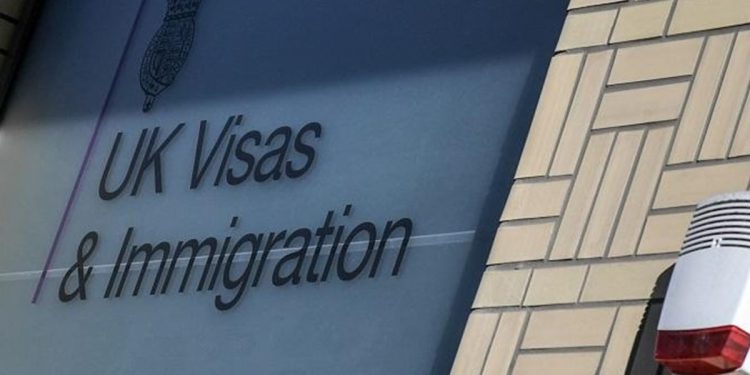In a move aimed at addressing the issue of net migration, the government led by Rishi Sunak in the UK has raised the salary requirement for individuals applying to reside in the country. This decision is part of a broader strategy by the ruling Conservative Party to demonstrate its commitment to reducing net migration ahead of the anticipated general election next year.
According to plans outlined by Home Secretary James Cleverly in the House of Commons on Monday, prospective migrants will now need to have a minimum annual income of £38,700 ($48,900) to qualify for working visas. This marks a significant increase from the previous threshold of £26,000. Cleverly emphasised the government’s goal of reducing net annual immigration by 300,000 in the future, although no specific timetable was provided.
Among the additional measures announced by Cleverly are the prohibition of overseas care workers from bringing family dependents and the discontinuation of the 20% salary discount that firms can offer to workers on the shortage occupation list. These steps collectively reflect the government’s efforts to address immigration concerns and fulfil its commitment to voters.
Addressing the issue of immigration, Home Secretary James Cleverly affirmed, “The British people will always do the right thing for those in need.” He emphasised the dual objective of not only halting illegal routes and addressing the influx of boats but also implementing a well-managed reduction in legal migration.
Cleverly’s statement comes amid mounting pressure on Chancellor Rishi Sunak from within the Tory party to devise a strategy to tackle the surge in immigration.
The call for action intensified after the Office for National Statistics reported last week that an estimated 672,000 more individuals moved to the UK than departed in the year ending June. This statistic has heightened concerns within the Conservative Party, with party strategists identifying immigration and the government’s perceived failure to curtail overall numbers as a pivotal electoral issue.
Government ministers have dedicated months to discussions on preventing the arrival of asylum seekers via small boats across the English Channel, a commitment among the five pledges put forth by Chancellor Sunak for voters to evaluate.
However, recent statistics from the Office for National Statistics (ONS) highlight the significant shifts in legal migration since the UK’s decision to exit the European Union in 2016. For Conservative Members of Parliament (MPs), the escalating numbers signify a perceived breach of the Brexit promise.
Following the UK’s departure from the EU, the Conservative Party can no longer attribute elevated migration figures to the free movement of people within the bloc. Instead, the majority of migrants now enter the country through government programs, including refugee visas for individuals from Ukraine and Afghanistan, work visas for professions such as health and social care, and occupations listed as facing shortages, along with students.
In the year leading up to June, net migration was solely influenced by non-EU nationals, with a notable influx of 768,000 more arrivals than departures. This marks a substantial increase from 179,000 just four years ago. In contrast, there was a net emigration of 86,000 among EU nationals during the same period.
Calls for decisive action are particularly vehement within the “New Conservatives,” a right-leaning caucus primarily holding seats in former Labour strongholds in the Midlands and the North that shifted allegiance to the Tories in 2019. Members of this group assert that they were elected based on a “solemn promise” to diminish migration.
John Hayes, a supporter of former Home Secretary Suella Braverman and an advocate for stricter immigration measures, expressed his perspective on the matter to the BBC prior to Cleverly’s statement. He emphasised the need to employ British workers for domestic jobs, characterising the solution as straightforward. Hayes welcomed reports of the newly proposed measures, stating, “We’re seeing sense, we’re doing the right thing by the British people.”
However, Sunak is poised to encounter substantial opposition from the business sector, risking the amplification of economic challenges linked to supply shortages and inflation. The newly proposed wage requirements may intensify pressure on struggling local councils, which typically allocate a significant portion of their budgets to service care—an industry heavily reliant on migrant labour due to comparatively lower pay levels.
Additional elements outlined in Cleverly’s plans include:
1. Care companies, necessitating increased regulation to sponsor visas.
2. A 66% surge in the annual immigration health surcharge, raising it to £1,035.
3. Reduction in the number of occupations listed on the shortage list.
4. Family visas restricted to higher earners.
5. A reassessment of the UK’s graduate route to visas to prevent overstaying.
In response to Cleverly’s announcements, the opposition Labour Party contended that many of the measures represent a reversal of policies previously introduced by the Conservatives, such as the salary discount for shortage occupation positions.
Yvette Cooper, Labour’s spokesperson on home affairs, criticised Cleverly in Parliament, stating, “There is nothing in this statement about training requirements and workforce plans. They have no grip and no proper plan. This is a chaotic approach.”
The regulations preventing staff from bringing dependents will have a significant impact on the care sector, warned Christina McAnea, general secretary of the Unison union, during an interview with BBC radio.
She highlighted the predominantly female composition of the workforce and expressed concerns about the message conveyed: “Remember, this is a predominantly female workforce, so we’re basically saying you’re only allowed to come here, but you can’t bring any children.”
In response to these concerns, Cleverly assured lawmakers that the government does not anticipate a shortage of staff in the sector due to the new rule. He suggested that data indicates a shift in applications towards individuals without dependents.
Simultaneously, the government announced its proximity to finalising a deportation treaty with Rwanda, a key element of its strategy to navigate its contentious plan to fly asylum seekers to the East African nation through the UK courts.











